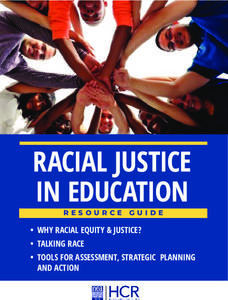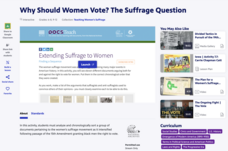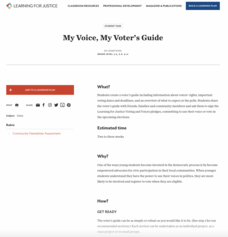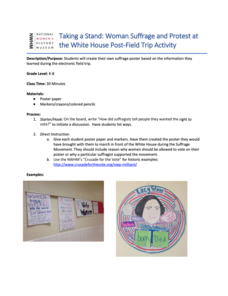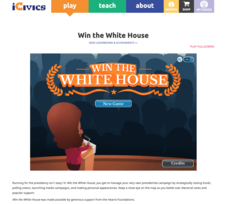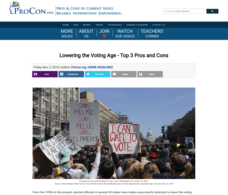Constitutional Rights Foundation
Elections, Money, and the First Amendment
Those who spend the most, win. Academics read informational text, participate in group discussion, and defend campaign reforms to understand the correlation between money, the First Amendment, and election results. The resource explains...
Constitutional Rights Foundation
Winner-Take-All: The Two-Party System
Two's company, three's a crowd. High school historians learn about the Electoral College, a two-party, winner-take-all voting system in the United States. The lesson explains the pros and cons of the two-party system, roadblocks for...
Constitutional Rights Foundation
Why Don’t More People in the U.S. Vote?
To vote or not to vote, that is the question. Secondary scholars explore voter turnout in the United States. The resource uses informational text, group discussion, and a worksheet to help academics understand hindrances to voting and...
Constitutional Rights Foundation
Suppressing the Vote
Voting rights have expanded over time, but some voters are still being suppressed. A thought-provoking resource explores the history of voter suppression in the US and efforts to remove roadblocks to voting. Young historians learn about...
Constitutional Rights Foundation
Purged From the Voter Rolls: Husted v. A. Philip Randolph Institute
Once a registered voter isn't always a registered voter. Academics explore the topic of voter registration and hindrances to remaining registered. The resource focuses on data analysis, federal voter registration law, and Supreme Court...
Constitutional Rights Foundation
Slavery and the Electoral College
How did slavery mold the creation of the US Constitution? The final instructional activity in the series focuses on how slavery impacted the creation of the Electoral College. Academics learn how the Electoral College was created because...
Constitutional Rights Foundation
270 Votes to Win: The Electoral College in the United States
What exactly is the Electoral College and how does it work? The lesson is part of a larger series on government that explains what the Electoral College is and how it helps determine an election winner. Academics participate in...
Teaching Tolerance
Voting in Your Town
A socially important resource focuses on voter turnout and roadblocks to voting. Scholars review resources on voting stats, watch a documentary, and participate in group discussion regarding voting in their local communities. Academics...
National Education Association
Racial Justice in Education Resource Guide
Strive for racial justice within your classroom community with help from an 80-page resource guide. Five modules move scholars through thoughtful, and reflective grand conversations to making a plan, then taking action. Learners write...
PBS
Gloria Steinem’s Ancestry and Women’s Rights Movements: Lesson Plan | Finding Your Roots
Introduce class members to Presidential Medal of Freedom winner, activist, writer, and lecturer Gloria Steinem with a PBS resource that not only investigates Steinem's ancestry but also encourages learners to trace their own.
PBS
Why Should Women Vote? The Suffrage Question
An online interactive activity asks learners to analyze a group of documents related to the women's suffrage movement and then place the documents on a timeline. The results assess users understanding of the progression of the women's...
Teaching Tolerance
My Voice, My Voter's Guide
Class members may be too young to vote, but that doesn't mean their voices are silent! After researching key information, such as policies for registering to what to expect at the polls, young scholars create and present election guides...
National Woman's History Museum
Taking a Stand: Woman Suffrage and Protest at the White House K-8
A class discussion opens a lesson on women suffragettes. Learners imagine they are preparing to protest for women's voting rights. Scholars create a colorful poster to hold up high when marching in front of the White House.
National Woman's History Museum
Seneca Falls and Suffrage: Teaching Women's History with Comics
As part of the study of women's history, young scholars examine Chester Comix's strips about the Seneca Falls Convention and four 19th century leaders in the struggle for equal rights. After researching other elements of the Suffrage...
National Woman's History Museum
Susan B. Anthony: She's Worth a Mint!
A instructional activity all about Susan B. Anthony showcases the Civil Rights leader's contributions towards equality. A Susan B. Anthony coin sparks engagement. Scholars take part in a discussion that sheds light on what being an agent...
New York State Education Department
US History and Government Examination: June 2011
Those who lived during the Great Depression could clearly draw a line between the roaring 1920s and the desolation of the following decade. Class members examine these two periods and compare them using an essay question prompt and...
PBS
Latinos at the Ballot Box
Latinx people have had a profound effect on voting patterns, going back to the 1950s. Using video clips from the PBS series "Latino Americans," scholars work to assemble a timeline of the interesting history. Then, pupils consider the...
Syracuse University
Women's Suffrage Movement
Women gained the right to vote in the twentieth century, but the fight for equality dates back centuries. Using an invitation to an 1874 suffrage convention, eager historians consider the motivations behind supporters of the suffrage...
iCivics
Win the White House
What does it take to win the White House? A video game allows young political operatives to try their hand at winning 1600 Pennsylvania Avenue by deciding on key issues, where and how to spend campaign dollars, and the role of polling...
ProCon
Voting Machines
Does technology always mean advancement? Scholars take a close look at the use of voting machines. Does using a machine make voting more effective? Readers consider the advantages and disadvantages of the current voting process. They...
ProCon
Voting Age
Should age matter when it comes to voting? Scholars read an article discussing the pros and cons of lowering the voting age to 16. They then consider both the advantages and disadvantages of having younger voters. After thinking about...
Soft Schools
Civil Rights
Informational text about the Civil Rights Movement challenges young historians to prove their reading comprehension skills with six multiple choice questions. After answers are submitted a new screen displays a score, answers—correct and...
Teaching for Change
A Documents-Based Lesson on the Voting Rights Act
How did the Voting Rights Act affect the daily lives of American citizens? A document-based lesson plan developed by the Student Non-Violent Coordinating committee (SNCC) presents a case study of the impact of the Voting Rights Act of...
Carolina K-12
Making First Vote Your Vote: Designing a Schoolwide Election
Encourage pupils to design an election plan for the entire school. They participate in a Board of Elections, create polling rules, discuss election controversies, write questions about the issues, run the election through an online...










